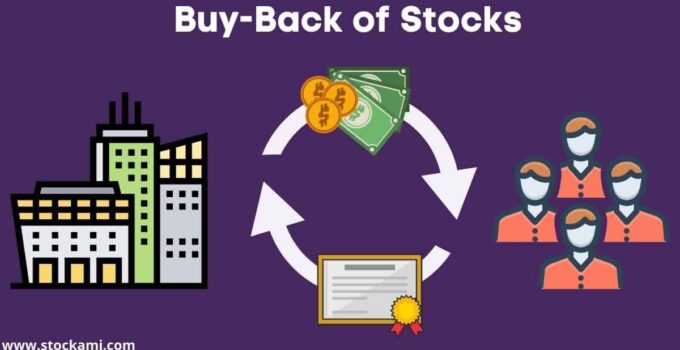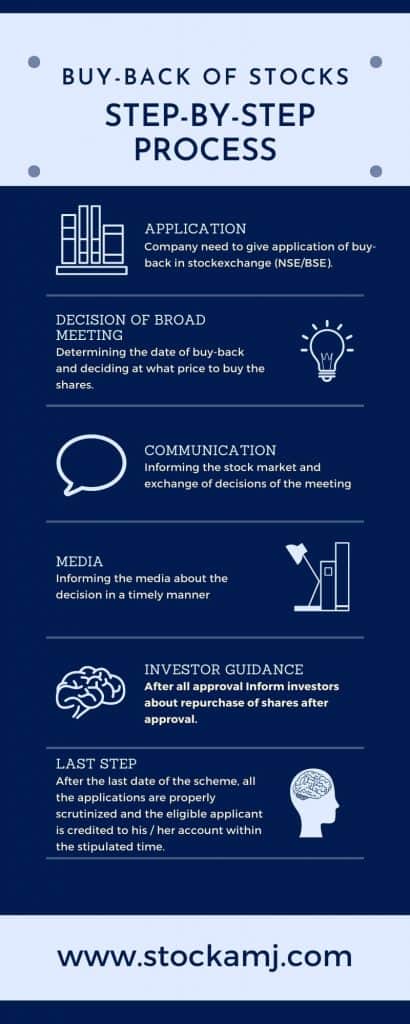The buy-back of shares is little bit a complex process but very easy to understand. There are so many pros & cons of buy-backs. To get benefit from buy-back investor must have at least one share of respective company.
Reason for Buy-Backs
- Shares buy back helps companies to Aggregation of ownership.
- Increasing the price of stock.
- Buy-backs can boost investor confidence.
What is Buy-Back of Shares ?
In the current scenario, the topic of share buy-back is frequently used in the financial sector. Some savvy investors seem to be taking advantage of this repurchase. Governments also use buy-backs to achieve their investment goals. Let’s learn more about this topic in this article.
Let us first briefly explain the meaning of repurchase of shares
- When a listed company (government or non-government) thinks its valuation is much higher than the current market price, or when a company wants to pay its shareholders more than the dividend, such a company buys its own shares from the shareholders at a higher rate than the market price. This is called buy-bank. In this process, the company has to follow some concrete rules. Also, certain paths have to be followed.
- Too often we experience one thing. When a company announces a repurchase of its shares, the current market price of that company is much lower than the repurchase price. Suppose a share is worth Rs.1000 A company will repurchase at a price of Rs.800 per share. If so, then ordinary investors get confused or they buy such shares in large quantities and repurchase the company over time.
- However, the company repurchases only certain shares and returns the rest. When those shares fall into the demat account of the original investor, the then market value of that stock may have dropped significantly. Therefore, in the whole transaction, there is a lot of frustration. You may have seen some such examples in recent times. For this reason, it is important to understand the plan.
Let us now look at the benefits of a buy-back repurchase plan.
Advantages of Buy-Back of Shares
Stakeholders Benefit
- This buy-back allows you to buy shares at a lower price and return them at a higher price and get a good capital gain in a short period of time.
- Despite the low market price, the company is repurchasing shares at a higher price, so the overall market outlook on the company can be positive. Therefore, the price of this company is likely to increase further in the future.
- Shareholders who earn more than Rs 10 lakh per annum in the form of dividends are taxable. Instead of paying dividends, they may be subject to lower tax returns.
- As the buy-back reduces the number of shares in the market, the price of the company may go up after the buy-back as per the demand-supply rules.
- This increases the liquidity of the shares.
The Benefit to the Company
- If a company / promoter is confident that the credit of their company is much higher than the market price, then the company can prove its confidence in the market by bringing a buy-back proposal.
- After the buy-back, the company’s share capital decreases, but there is no reason for the incident to affect the company. Therefore, even if the company’s income remains the same, it is divided into fewer shareholders. The result is an increase in the company’s stock.
- Often after a buy-back, the company’s market value rises sharply. (E.g. Infosys’s market price is much higher than last year’s buy-back price.)
Appropriate use of cash – Cash Management
- Cash accumulated by companies is sometimes not necessary for a new project. In such a case, the company can return the inactive cash to the shareholders in the form of buy-back. But it also implies that the issue is not in front of a new incremental project. This is sometimes seen in a negative light in the market.
- But in most buy-back cases, the company is viewed with confidence.
Government Benefits
In the near future we see the government trying to achieve its investment target through buy-back. This makes it possible for the government as a whole to raise a large amount of money for development. The repurchase of various government companies is an indication of this. E.g. The buy-back scheme of companies like Indian Oil, ONGC, Bharat Electronics was recently implemented. In addition to the government, ordinary investors can also take advantage of this scheme. The investment target of Rs 80,000 crore a year and the promise of many repurchase opportunities in the years to come.
Disadvantages of Buy-Back of Shares
- Reduces cash surplus with the company.
- Fear of share price manipulation.
- It could divert away the company’s funds from productive investments.
- Buy-back can cause shortage of shares.
- Buy-back is always the company’s last option to use cash.
- Buy-back has its own risk.
Stock Buy-Back Process Step-By-Step
Some Important Concepts of Buy-Back Need to Understand
Role of Company Board of Directors Meeting
The date of the Board of Directors meeting is decided in the market to decide whether to buy or not. From the time the date of the meeting was announced, the investor needs to keep an eye on the stock and its price difference. The investor should then understand the details of the buy-back plan to be announced after the actual meeting. In particular, the total amount used for buy-back is the value of the buy-back announced by the company and the overall period during which the buy-back will continue is important for the investor. All these details should be well understood.
Acceptance Ratio (Acceptance / Success Ratio)
- Not all the shares you offer will be repurchased by the company. The price set for this buy-back plan and the total amount used for the buy-back can be used to estimate how many of your total shares the company will buy.
- You can estimate how many shares you will buy back on whether or not the major and major shareholders (promoters) will join the buy-back scheme.
- It is estimated that out of the total number of stocks you have, the number of stocks that will be bought back is generally estimated. If the market price of the company’s shares declines after the end of the buy-back scheme, there is a possibility of a loss in the overall transaction. Therefore, after thorough consideration, you should decide your action on this buy-bank.
- Once the buy-back scheme is accepted by the company’s board of directors, it goes to SEBI and similar government agencies for scrutiny and approval. In rare cases, the buy-back scheme may be cancelled by such organization due to some technical reasons. A recent example is Larsen & Toubro. The company’s buy-back plan was later cancelled by the regulator for some technical reasons. (Because the debt-capital ratio of a company is less than required)
- In such a case, the market price of such shares is likely to fluctuate significantly. This too should be looked at carefully and invested.
Small Investors
- Each buy-back plan has a fixed amount reserved for small investors. In which most of the stocks near you are likely to be bought-back. There are no big investors in this group. Therefore, it is often beneficial to buy shares within such limits and join the scheme.
- Now let’s see who these small investors are. At present, total aggregate buy-back scheme (buy-back value multiplied by your total shares) is considered as a group of small investors if the amount is less than two lakhs. In such a case, it may be more profitable to buy shares in two to three demat accounts with another person in the household than to buy all the shares in your own name.
Demat Account
- At present, it is not necessary for an investor to have a demat account to qualify for a buy-back plan, but it is much easier to join a buy-back plan from a demat. Everyone must have a demat account.
Taxation
- Profit from a buy-back plan is considered short or long term capital gain. It depends on how long you have the shares and then you have to pay the appropriate income tax on those profits.
Arbitrage:
- Some people are investors in a company for many years. The company has given them a lot of dividends and bonuses in the past. Therefore, these investors do not even think of selling such shares no matter how much the price goes up. But in such a case, there is a definite advantage and zero loss for them.
- They should give to the company as many shares as the company will definitely accept in the buy-bank scheme and on the same day buy the same number of shares from the market at the current price (which is usually much less than the buy-back price).
- In a few days, his demat account will have the same balance as before. However, the profit due to price difference will be available to them without any risk and the profit will be credited to their bank account in about a month. This is called arbitrage. If necessary, seek the help of an expert. In particular, it should be seen that there is no loss due to taxes. Most of the time such an exchange is likely to benefit.
Conclusion
In short, if you participate in the buy-back plan properly and carefully, you will have a better chance of making a good profit in the near future by accepting less risk. However, this requires careful analysis of the buy-back news.
Even before the announcement of the buy-back plan, if you can predict in which company the buy-back plan can be implemented, then more profit is possible.
The buy-back scheme is not easy to understand but not very difficult. Just like learning to drive a car, first you have to buy your own car and then you can learn it properly, in order to have a successful turnover in the buy-back scheme, you have to participate in this scheme by taking at least one share of the company that has announced this scheme. .
In the coming year, some special events will have a big impact on the stock market, such as the Lok Sabha elections, new policies of the new government, budget, etc. This will lead to a sharp fall in the market price of the company’s shares. In such a scenario, along with other options, investors should be on the lookout for opportunities to reap the benefits of the forthcoming repurchase plan.
Take a Look





